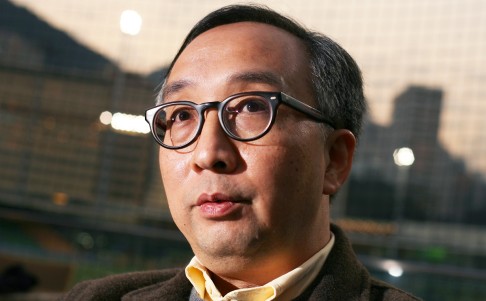'Undergrad' has upset city's leader on topic of autonomy before, with a very different response
GARY CHEUNG AND PETER SO
PUBLISHED : Sunday, 18 January, 2015, 11:43pm
UPDATED : Monday, 19 January, 2015, 9:14am
Former governor Sir David Trench (left) and Leung Chun-ying. Photos: Chan Kiu, Sam Tsang
Chief Executive Leung Chun-ying's attack on the student magazine Undergrad reminded one of its former editors of how very differently a colonial governor had tackled a similar situation.
Andrew Fung Ho-keung is now chief executive of the Policy Research Institute but in the 1960s he was editor-in-chief of Undergrad when the magazine, launched in 1952, had already earned a reputation for being critical of the government and had published student leaders' views on autonomy.
 Andrew Fung Ho-keung was editor-in-chief of Undergrad in the 1960s. Photo: Nora TamWhile Leung chose to kick off his policy address by condemning the "fallacies" in an article and a book about autonomy published by the magazine, in 1968 the then governor David Trench took a more subtle approach to defend his authority.
Andrew Fung Ho-keung was editor-in-chief of Undergrad in the 1960s. Photo: Nora TamWhile Leung chose to kick off his policy address by condemning the "fallacies" in an article and a book about autonomy published by the magazine, in 1968 the then governor David Trench took a more subtle approach to defend his authority.
He sent in a piece entitled The Basic Nature of Government - an Article for Undergrad to explain his governing philosophy.
"Undergrad is a paper which not only concerns itself with matters of direct student interest but, as I am glad to see, with public affairs also," Trench wrote.
He said his article was intended to aid more constructive writing" and "help readers to evaluate what they read both here and, indeed, elsewhere".
Half a century on, Fung is still impressed. "The colonial government was more sophisticated in handling dissenting voices," said Fung. "Trench sent us his article obviously in response to our criticism of the colonial government." Leung would have been better following the ex-governor's lead, Fung added.
The magazine is the official publication of the University of Hong Kong Students' Union, which funds it. Its management and editorial direction became independent in the late '60s and its editor-in-chief and two deputies have been elected by students since 1973.
It started publishing Chinese-language articles in the 1960s and became a platform for debate among student activists from various factions. Topics covered included calls for Chinese to be the city's statutory language and for Chinese sovereignty over the Diaoyu Islands.
The disgraced former chief secretary Rafael Hui Si-yan, 66, who has been jailed for corruption, was once on the magazine's editorial board.
Dr Sung Yun-wing, an economics professor at Chinese University, edited the forum pages back in 1967. He was surprised by Leung's remarks as independence was not an issue in the student Occupy protests last year.
He said the Special Branch - a mysterious agency within the Royal Hong Kong Police Force - had gathered information on Undergradstaff. "It was not surprising that the colonial government had been monitoring us."
 Professor Lui Tai-lok was editor-in-chief of the magazine in 1980. Photo: Dickson LeeProfessor Lui Tai-lok, a sociologist at the Hong Kong Institute of Education, who was the magazine's editor-in-chief in 1980, noted that back then most of the magazine was written in Chinese, so few government figures read it.
Professor Lui Tai-lok was editor-in-chief of the magazine in 1980. Photo: Dickson LeeProfessor Lui Tai-lok, a sociologist at the Hong Kong Institute of Education, who was the magazine's editor-in-chief in 1980, noted that back then most of the magazine was written in Chinese, so few government figures read it.
On RTHK's City Forum yesterday, Andrew Fung Wai-kwong, HKUSU president in 1984 and now the chief executive's information coordinator, criticised students for "advocating independence … although Hong Kong has been part of China since ancient times".
Legislator Ip Kin-yuen, the union's vice-president in 1983, said students should be free to explore academic issues.
Additional reporting Tony Cheung
http://m.scmp.com/news/hong-kong/article/1681699/hong-kong-governors-and-chief-executives-take-different-approaches